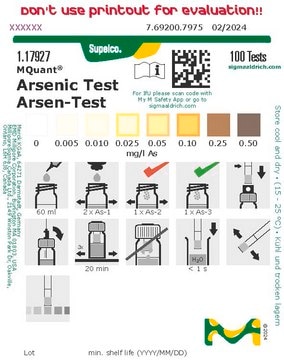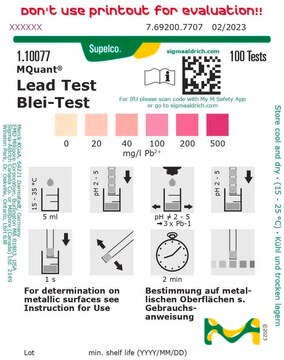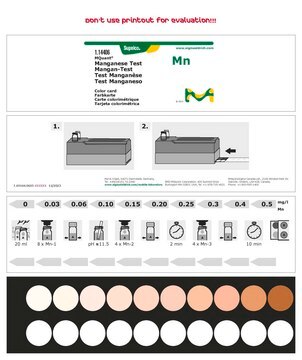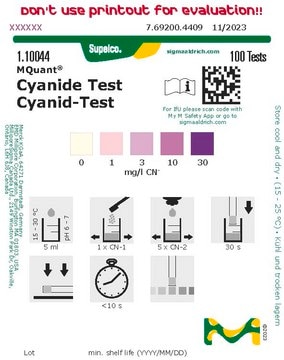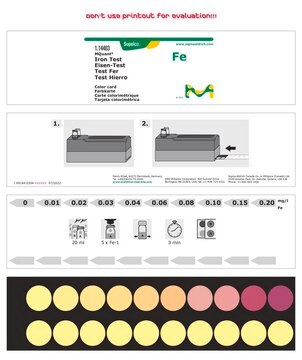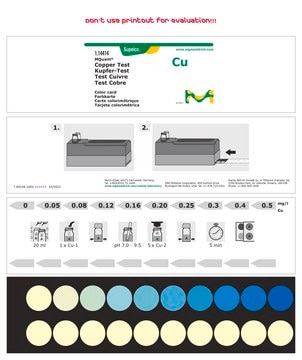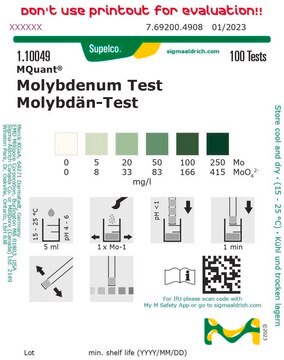1.17917
Arsenic Test
colorimetric, As 0.02-3 mg/L, MQuant®
Synonym(s):
Arsenic chemical test strips
Sign Into View Organizational & Contract Pricing
All Photos(1)
About This Item
UNSPSC Code:
41116116
Recommended Products
description
semi-quantitative
Quality Level
product line
MQuant®
specific analyte(s)
arsenic
reaction suitability
reaction type: modified Gutzeit test
As measuring range
0.02-3 mg/L
detection method
colorimetric
storage temp.
15-25°C
General description
Method: Colorimetric with test strips and reagent, 0.02 - 0.05 - 0.1 - 0.2 - 0.5 mg/L As, 0.1 - 0.5 - 1.0 - 1.7 - 3.0 mg/L As, MQuant®
The arsenic test strips are suitable for measuring arsenic in water, pharmaceutical products, prepared biological specimens and liquid foods. Within this MQuant® Arsenic test, test strips are used in combination with additional reagents. Arsenic is liberated from the sample by adding zinc powder, a solid acid, and - for the elimination of interfering sulfide ions - an oxidizing agent. On the reaction zone of the test strip a yellow-brown dye is formed. The concentration of arsenic(III) and arsenic(V) are measured semi-quantitatively by visual comparison of the reaction zone of the test strip with the fields of a color scale. The test strips are perfect for pre-testing a sample in an economic and quick way to estimate the arsenic concentration and a possible dilution factor prior to using a quantitative method such as our Spectroquant® test.
The arsenic test strips are suitable for measuring arsenic in water, pharmaceutical products, prepared biological specimens and liquid foods. Within this MQuant® Arsenic test, test strips are used in combination with additional reagents. Arsenic is liberated from the sample by adding zinc powder, a solid acid, and - for the elimination of interfering sulfide ions - an oxidizing agent. On the reaction zone of the test strip a yellow-brown dye is formed. The concentration of arsenic(III) and arsenic(V) are measured semi-quantitatively by visual comparison of the reaction zone of the test strip with the fields of a color scale. The test strips are perfect for pre-testing a sample in an economic and quick way to estimate the arsenic concentration and a possible dilution factor prior to using a quantitative method such as our Spectroquant® test.
Application
- Improved On-Site Characterization of Arsenic in Gypsum from Waste Plasterboards Using Smart Devices.: The research highlights the development of smart device-based arsenic tests for on-site characterization of arsenic in gypsum, enhancing the efficiency and accuracy of environmental monitoring and waste management (Tafu M et al., 2022).
- MnFe(2)O(4) micromotors enhanced field digestion and solid phase extraction for on-site determination of arsenic in rice and water.: This study employs arsenic tests in conjunction with MnFe(2)O(4) micromotors for on-site arsenic determination in rice and water samples, showcasing advancements in sample preparation and field analysis techniques (Luo Y et al., 2021).
- Impact of receipt of private well arsenic test results on maternal use of contaminated drinking water in a U.S. population.: The research evaluates the behavioral impact of receiving arsenic test results on maternal use of contaminated drinking water, emphasizing the importance of arsenic testing in public health interventions (He X et al., 2018).
- Test for arsenic speciation in waters based on a paper-based analytical device with scanometric detection.: This study presents a novel paper-based analytical device for arsenic speciation in water, utilizing scanometric detection to offer a cost-effective and portable solution for environmental monitoring (Pena-Pereira F et al., 2018).
Legal Information
MQUANT is a registered trademark of Merck KGaA, Darmstadt, Germany
SPECTROQUANT is a registered trademark of Merck KGaA, Darmstadt, Germany
signalword
Warning
hcodes
Hazard Classifications
Aquatic Acute 1 - Aquatic Chronic 1 - Eye Irrit. 2 - Skin Irrit. 2
Storage Class
11 - Combustible Solids
wgk_germany
WGK 2
Certificates of Analysis (COA)
Search for Certificates of Analysis (COA) by entering the products Lot/Batch Number. Lot and Batch Numbers can be found on a product’s label following the words ‘Lot’ or ‘Batch’.
Already Own This Product?
Find documentation for the products that you have recently purchased in the Document Library.
Our team of scientists has experience in all areas of research including Life Science, Material Science, Chemical Synthesis, Chromatography, Analytical and many others.
Contact Technical Service